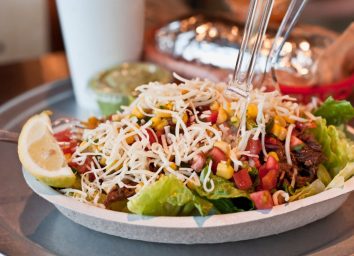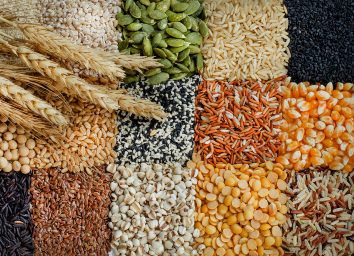The Best Low-Carb Diets—Ranked!
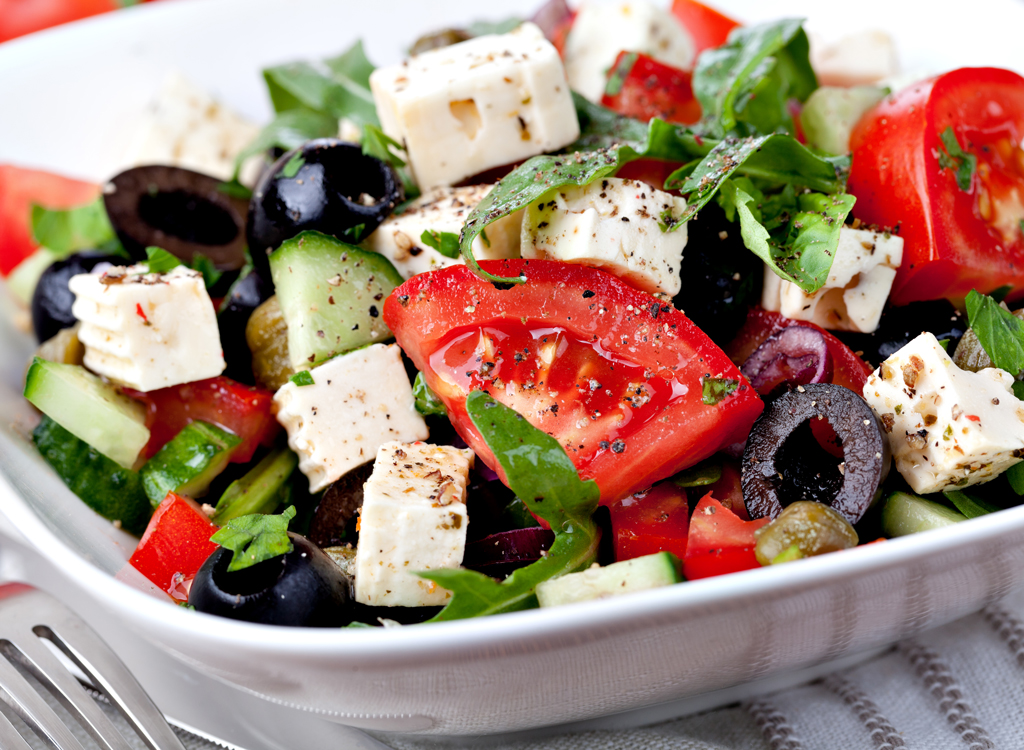
So you want to go on a low-carb diet, huh? There’s no shortage of options. In fact, many of the trendiest diets around (we’re looking at you, keto) are almost totally eliminating carbs in favor of getting your calories from protein and fat. We understand the allure of a diet that sacrifices pasta for a bunless bacon cheeseburger and endless guac, but are low-carb diets actually a good (or safe) idea?
Yes and no, says Amy E. Rothberg, MD, PhD, an obesity specialist and director of the weight management clinic at Michigan Medicine.
A low-calorie, low-carb diet of non-starchy vegetables and whole grains does have its benefits—especially if you also cut out processed foods and simple sugars. “[These diets] can be very effective at controlling blood sugar and reducing blood pressure and cholesterol,” she explains. They may even help you lose weight. The only catch? “The fat in the diet just has to be ‘good’ fat, like polyunsaturated and monounsaturated fat.”
And that leads us to our next point: The nature of any diet that restricts the consumption of one macronutrient (like carbs) is that you may end up overeating another. Most notably, dieters who go low-carb tend to eat more fat.
More fat isn’t inherently bad; healthy fats help you stay full for longer, are essential for transporting essential nutrients throughout your body, and can even fight inflammation. The problem comes when the fat in your diets is more saturated than not (i.e. the type of fat you find in bacon cheeseburgers).
So where does that leave us? Low-carb diets can support meaningful weight loss, but, when done improperly, they can also make you unhealthier. To make sure you’re on the right side of that equation, we asked nutrition experts to tell us which low-carb diets are worth trying and which should you skip.
Here are the 5 most popular low-carb diets—ranked from worst to best. Read on, and for more on how to lose weight, you won’t want to miss The Best Ways to Lose Belly Fat for Good, Say Doctors.
Worst: Keto
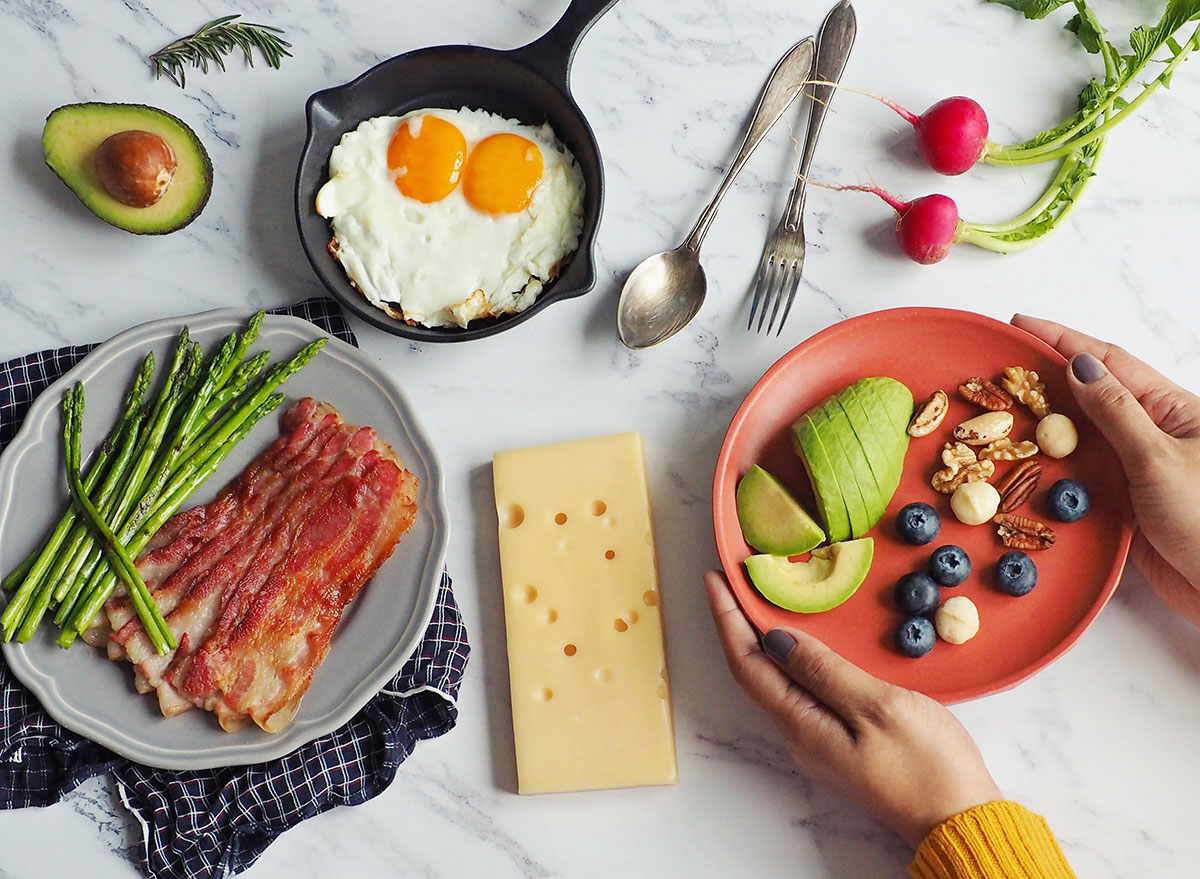
What is the keto diet?
Originally designed as a medical diet to help children with epilepsy control their seizures, the keto diet has become popular among fad dieters for its rumored benefits on weight loss (and the fact that you’re encouraged to eat high-fat foods like butter, cream cheese, coconut oil, and red meat).
And therein lies the problem with keto: because while it is a low-carb diet (keto experts recommend getting less than 50 grams of carbs per day), it’s also a high-fat diet. By nature, that leaves little room for nutrition powerhouses like fruits and vegetables. (That’s why vegetarian keto diets are next to impossible.)
“On a true keto diet, calories from fat should be above 70% and carbs should be under 10%,” says registered dietitian Danielle McAvoy, RD, senior manager of nutrition and culinary product for Territory Foods. “Getting to 70% of calories from fat means a significant portion of the diet is fat, and if you’re not careful to choose mostly unsaturated fats, it can lead to increased cholesterol and risk of heart disease down the road.”
Can it help you lose weight?
Maybe at first—but don’t expect the results to stick around (or necessarily make you healthy in the meantime). McAvoy warns that while low-carb diets can be effective for weight loss in the short-term, research shows that the weight usually comes back after 12 to 24 months because of how hard the diets are to maintain for any meaningful length of time.
Do experts recommend it?
Nope! In fact, according to Dr. Rothberg, consuming less than 50 grams of carbs per day can be downright dangerous without medical monitoring.
“If really done correctly, a ketogenic diet can result in electrolyte shifts, diuresis, anorexia, and of course…the diet necessarily becomes enriched in fat,” she explains.
Registered dietitian Lainey Younkin, MS, RD, LDN, weight loss dietitian at Lainey Younkin Nutrition, also puts keto at the bottom of her recommendation list.
“The drastic drop in carbs can lead to nausea, vomiting, headache, fatigue, dizziness, insomnia, and more,” says Younkin. (See: Do You Have the Keto Flu? Why You Might Feel Sick on the Keto Diet.) Plus, “the long-term effects of eating so much fat are also not fully understood.”
Related: 7 Warning Signs You Should Stop the Keto Diet Immediately
Atkins

What is the Atkins diet?
One of the original low-carb diet plans, Atkins, dates all the way to the 1960s. A cardiologist named Robert Atkins wanted to develop a plan that emphasized losing weight by eating the right foods, not fewer foods.
Atkins is similar in structure to the keto diet in that it reduces carbs while increasing protein and fat sources; the reason it’s not at the very bottom of this list is that this shift isn’t permanent on an Atkins diet. As you work through the four phases of the diet and get closer to your weight loss goal, you can begin adding in vegetables, fruits, and eventually even carbs again (as long as it doesn’t cause you to regain the weight you’ve lost).
Can it help you lose weight?
In theory, yes, but the pitfalls here are the same as they are with keto. There’s a good chance the weight loss won’t stick because you aren’t meant to keep up with extreme carb reduction forever.
A 2007 study published in JAMA compared weight loss results across four diets, one of which was Atkins. Participants in the Atkins group lost the most weight at 12 months, beating out other low-carb and low-cal diets. But in an older New England Journal of Medicine study, researchers found that the weight loss results on Atkins didn’t last; While weight loss was significant compared to the control group at three months, it wasn’t anymore at 12 months.
Do experts recommend it?
Many of our nutrition experts noted that Atkins is a poor choice for a carb-reducing diet—mostly because it throws out carbs and doesn’t replace them with anything highly nutritious.
“I was never a fan of Atkins because it promoted unhealthy eating and just removing carbs, so a cheeseburger was fine if you didn’t eat the bun,” says registered dietitian Amy Shapiro, MS, RD, CDN, and founder of Real Nutrition. “This led many people to overeat cheese and high-fat meats with abandon, not considering how unhealthy these behaviors are.”
Paleo
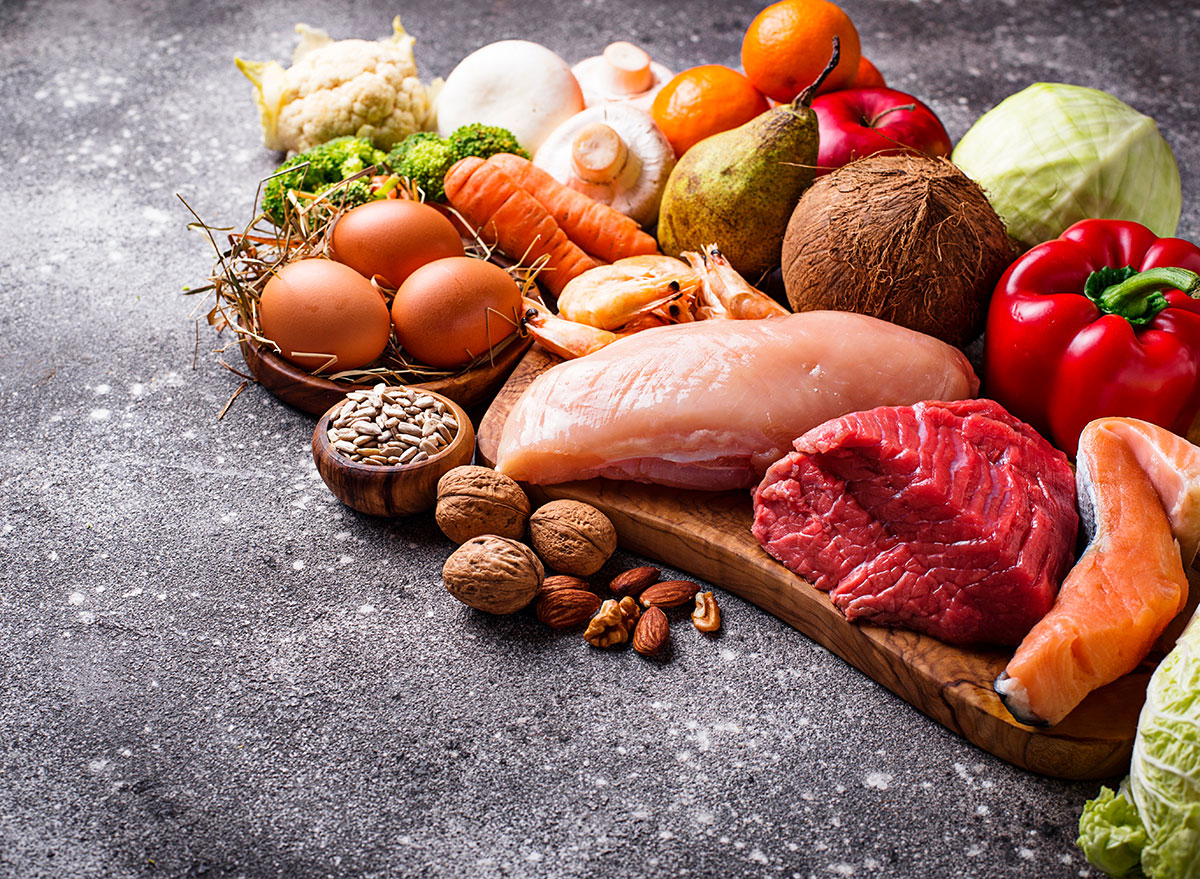
What is the paleo diet?
Paleo is short for paleolithic, as in the prehistoric era when our ancient ancestors wandered around eating only what they could hunt and gather (as opposed to what they could grow, like grains, or process from other sources, like dairy).
Foods allowed on the paleo diet include meat, seafood, fruits, vegetables, nuts, seeds, and oils. According to the official paleo diet website, these foods promote health because our bodies were designed to eat them; therefore, the digestion of these foods is “programmed into our DNA.”
Can it help you lose weight?
The studies we have so far are few and far between, with most looking at small groups of participants. For example, a 2013 Journal of Internal Medicine study showed an average 10-pound reduction in weight among female participants with obesity, but only 10 women took part in the study.
One important thing to note about paleo is that your protein intake will be pretty high; since our ancestors would have relied heavily on hunted food, they would have eaten way more protein than we typically do today. Although high-protein diets can keep you fuller for longer, contributing to fewer overall calories and assisting with weight loss, if you focus too much on protein, you risk coming across the same disadvantages built into the keto and Atkins diets. For example, you could be consuming too much saturated fat and not enough micronutrients from fruit and veggies. (Related: 7 Ways Eating Too Much Protein Can Harm Your Health)
Do experts recommend it?
Shapiro does, with some caution; it’s higher in protein than she normally suggests, but it allows for fruits and vegetables, promotes the consumption of good quality proteins like grass-fed beef and wild fish, removes processed sugars, and can be sustainable.
“It’s an easy program to maintain long-term, and you can eat out, visit friends, and travel on it, because many locations have protein, sweet potatoes, and veggies available,” she explains.
Low-carb Mediterranean
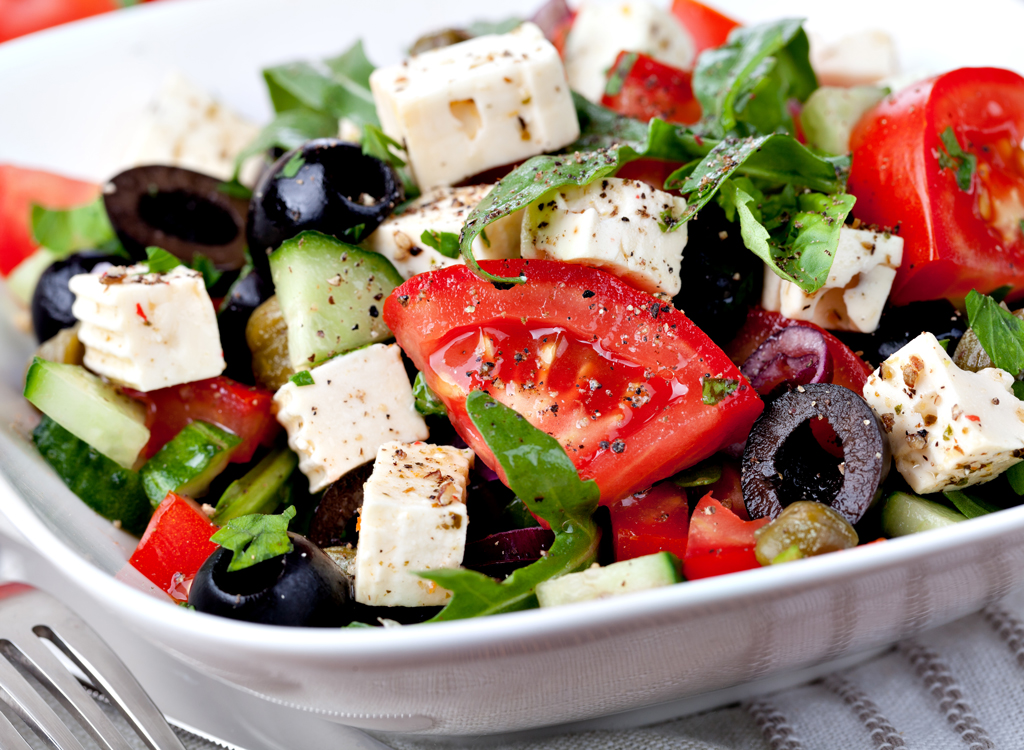
What is a low-carb Mediterranean diet?
The standard Mediterranean diet takes its meal planning from countries like Italy and Greece, where fish and seafood, vegetables, and healthy fats reign supreme. Chicken and turkey are eaten in moderation, as is dairy, but red meat is not a typical part of the diet.
Modifying the Mediterranean diet to be low-carb is fairly simple since the diet isn’t high in carbs to begin with. It mostly involves swapping some of your whole grains for veggies and legumes, like cooking with zoodles instead of spaghetti and emphasizing low-carb vegetables and fruits (like carrots and blueberries) instead of higher-carb ones (like potatoes and bananas).
Can it help you lose weight?
Yes! According to McAvoy, the Mediterranean diet has consistently been ranked as the top overall diet for weight loss, heart health, and diabetes. In a 2019 study published in Nutrients, researchers went so far as to say that the diet should be adopted as a “lifestyle plan” for disease prevention and a tool in the fight against the obesity epidemic.
Do experts recommend it?
The Mediterranean diet is actually one of the most popular diets among nutrition experts. It emphasizes a healthy balance of foods and helps you form good eating habits that could last indefinitely. When you modify the diet to reduce carbs, you reap even more benefits.
“The reason that doing a low-carb version of the Mediterranean diet is ideal is because most of the fat sources in the Mediterranean diet are healthy, unsaturated fats. [So] instead of eating bacon, butter, and cheese, you’re eating olive oil, fish, and nuts,” says McAvoy. “This makes it both heart-healthy and low-carb, which is a great combo for weight loss and overall health.”
Best: Just plain ‘low-carb’

What is a typical “low-carb” diet?
Good news for the diet-averse: a generic low-carb “diet” isn’t actually a diet at all! It’s a commitment to cutting down on simple carbs as much as possible, replacing them with whole-grain options, and even swapping out carb-heavy foods (like whole-grain pizza crust) with more nutrient-rich versions (like homemade cauliflower crust).
That’s why this non-diet takes the number one spot here—you don’t have to adopt a prescribed diet plan, just make small, daily modifications to your carb intake.
“Eat smaller portions of white pasta, bread, rice, and desserts, and fill half your plate with vegetables, adding whole grains like quinoa and more protein and healthy fats to meals,” Younkin suggests, explaining that any low-carb diet focusing on reducing portions of certain foods will be easier to follow than one where you have to count carbs by grams.
Can it help you lose weight?
You bet! One of the biggest reasons why is because a low-carb diet may actually affect your hunger; a randomized trial published in 2017 in Nutrition, Metabolism & Cardiovascular Diseases found that levels of an appetite-related hormone called peptide YY (which makes you feel fuller after eating) were higher when participants followed a low-carb diet versus a low-fat one. It’s also possible that when you reduce carbs you naturally reach for more healthy sources of protein and fat, which can make you feel fuller longer, too.
Do experts recommend it?
Definitely. Many of the experts we interviewed encouraged dieters to skip the fads and simply focus on reducing overall carbs in a way that’s tailored to your personal preferences.
“I would not recommend any specific low-carb diet,” says Dr. Rothberg, “[but] I would find a low-carb plan where you can eliminate the unnecessary carbs—donuts, pastries, bread, sugared cereals—and replace them with more legumes and non-starchy vegetables.”
Doing so, she argues, will allow you to actually sustain and maintain the diet over a long period of time—one of the strongest indicators of weight loss success. On that note, why don’t you check out these 30 Ways To Lose Weight and Keep It Off.

